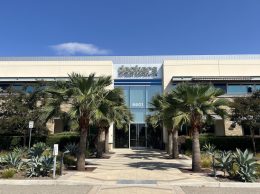Region’s stocks slip amid market-wide slide
IN THIS ARTICLE
- Banking & Finance Topic
- Tony Biasotti Author
By Tony Biasotti Wednesday, June 15th, 2022

After years of charging forward, U.S. stocks have gone into hibernation, at least according to the common definition of a bear market: a market-wide decline of 20% or more from a recent peak.
Most major indices are down at least that much from their highs earlier this year, with the biggest losses coming June 13. Companies based in the tri-county region were not spared, with some of them losing nearly 10% on that day.
Here’s how the region’s six largest publicly traded firms have fared in the new bear market:
AMGEN
The region’s biggest publicly traded company, and one of the world’s biggest biotechnology firms, Thousand Oaks-based Amgen escaped the worst of the June 13 sell-off. Its shares closed at $236.77 that day, down just 1.3% from the previous trading day. Amgen opened at $236.53 on June 15.
Angen has had good news in recent weeks on federal approvals of a new treatment using one of its biosimilar drugs and other positive results in ongoing drug trials, and its shares are actually up since the start of 2022, by 3.7%. The company is one of the 30 members of the highly selective Dow Jones Industrial Average, and the Dow as a whole is down 16.4% since the start of the year.
TRADE DESK
The tri-county region’s second largest company by market capitalization is The Trade Desk, an advertising technology company based in Ventura. Like most internet-based companies, The Trade Desk has been hit hard by the market’s recent bear turn.
Shares of The Trade Desk closed at $45.40 on June 14, down 50.5% since the start of the year. Its worst days were in early March, and on June 13 it lost 7.5%.
Its performance in 2022 has been even worse than that of the Nasdaq as a whole, where The Trade Desk trades. The Nasdaq is down 30% since the start of 2022.
The Trade Desk’s share price has now returned to about where it was in mid-2020, erasing two years of gains attained during a strong bull market for tech stocks.
Trade Desk CEO Jeff Green is among the richest people in the tri-county region, with his net worth estimated by Forbes at $3 billion, based on the company’s current share price. That total has dropped by about $2 billion since late 2021.
Analysts believe The Trade Desk is now significantly underperforming its potential. The average price target of 18 analysts tracked by Yahoo Finance is $75.89, and most analysts rate the stock a “buy” or a “strong buy.”
TELEDYNE
Teledyne, a defense and technology conglomerate based in Thousand Oaks, saw its shares climb in March and April as the war in Ukraine raised the likelihood of increased defense spending. But between April 20 and May 20, the stock lost 21% of its value.
Teledyne closed at $364.83 on June 14, a 22.7% decline since the start of the year. The average price target of the seven analysts tracked by Yahoo Finance is $525.57, and most analysts have a “buy” rating on the stock.
OLAPLEX
Olaplex, a Montecito-based hair products company that went public last year, closed at $14.84 on June 14, about half of its value at the start of 2022. Those losses came entirely in January and February, and the stock has held fairly steady since then, though it did drop 8% on June 13.
Analysts are bullish on Olaplex: All 12 of them tracked by Yahoo Finance rate the stock either a “buy” or a “strong buy,” with an average price target of $24.27.
DECKERS
Goleta-based Deckers Brands owns Ugg, Teva, Hoka One One and other footwear brands. Its stock lost 7.8% in a single day on June 13. It is down 31.4% for the year, and closed on June 14 at $251.74.
Despite those struggles, the first half of 2022 has held plenty of good news for Deckers. The company set revenue records in 2021 and beat analysts’ earnings expectations, sending its shares up 22% on May 20, the day after it released its fourth quarter and full-year earnings report. Sales of Ugg boots alone hit $1.9 billion in 2021, and Deckers as a whole reported more than $3.1 billion in revenue.
PROCORE
Procore, a Carpinteria-based company that provides cloud software to the construction industry, closed at $43 on June 14, down 46.2% from the start of the year. Its decline on June 13 was about 5%.
Procore continues to show strong revenue growth, including a 33% increase from 2020 to 2021. But it has yet to turn a profit, and its $50 million net loss in the fourth quarter of 2021 was 6% bigger than its quarterly loss a year earlier.












